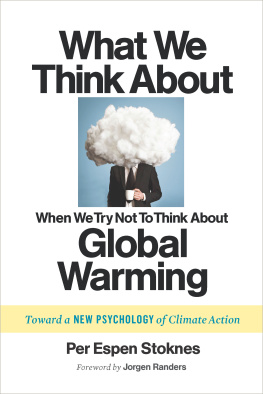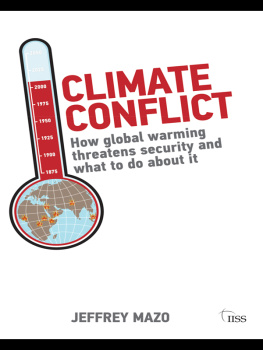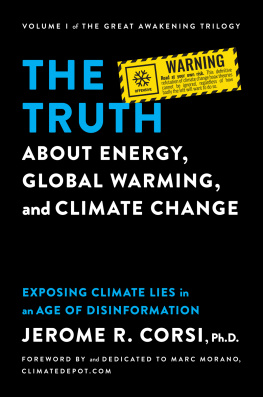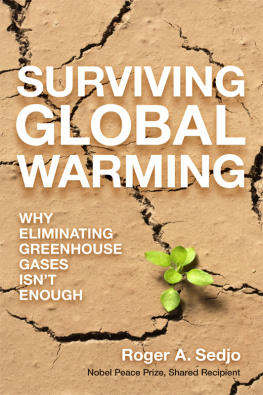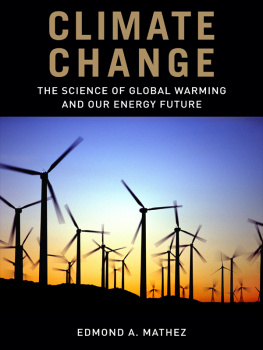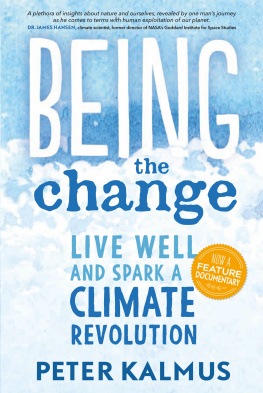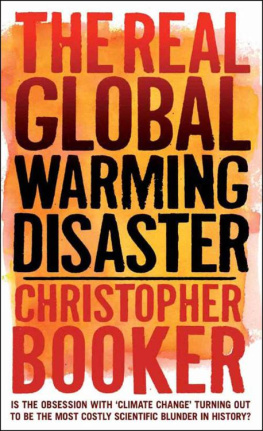ADVANCE PRAISE FOR What We Think About When We Try Not To Think About Global Warming
The human brain is poorly equipped to cope with mind-numbing problems like climate change. Per Espen Stoknes tell us whyand then explains what we can do to change the way we think, act, and live. Highly recommended.
John Elkington , cofounder of Volans, SustainAbility, and Environmental Data Services (ENDS) and coauthor of The Breakthrough Challenge
How, most effectively, to communicate the reality and ramifications of a slow-motion planetary meltdown? Whether you are a scientist or a CEO, an activist or a slacker, this book provides a simple toolkit for breaking down frozen attitudes. As a work that surveys a great deal of psychological research, its at once accessible, practical, andin its last thirdrichly reflective and evocative. In these concluding chapters, Stoknes wrestles eloquently with the ways in which earthly calamity reverberates and sometimes wreaks havoc in any persons innermost sense of self and meaning.
David Abram , author of The Spel l of the Sensuous
In a fresh and intimate voice, Per Espen Stoknes navigates the obstacles and collective denial of climate change. Drawing on his own deep love of nature, he suggests ways to overcome our Deep Grief by creating a spiritual connection with the air around us. In every way, this is a book full of new perspectives and insights.
George Marshall , author of Dont Even Think Ab out It: Why Our Brai ns Are Wired to Igno re Climate Change
If information enlightened, then effective climate policies would have been put in place two decades ago, after the second IPCC assessment. The recent, massive fifth assessment enlightens only a teeny bit more. Stokness small, powerful, readable book enables us to build the social networks that will lead to action and change our old stories, the blinders that comfort so many along our path to destruction. Read it, get to work, and find joy in being effective.
Richard B. Norgaard , coauthor of The Climate Challenge Society and professor emeritus, University of California at Berkeley
Mahatma Gandhi said First they ignore you, then they laugh at you, then they fight you, then you win. Were in this last phase, but to win we need to change tactics, from using guilt to draw attention, to instead using persuasion to change behavior and policy at a mass scale. Per Espen Stoknes shows the way with this brilliant description of how to go with rather than ag ainst the flow of human nature and thus shift society to action. There is no more important challenge facing society today and Stokness contribution is crucial.
Paul Gilding , author of The Great Di sruption
Science is no longer the bottleneck to action on climate change. Why do we so often ignore, deny, and resist the science? Why arent we outraged, demanding change? In a style both rigorous and personal, Per Espen Stoknes explains why, and, more importantly, offers strategies for success. A pleasure to read, this book can help us all become more understanding, more committed, more effectiveand, along the way, more joyful.
John Sterman , MIT Sloan School of Management and author of Business Dynamics: Systems T hinking and Modeling for a Complex World
Stoknes offers expert insights, drawn from the discipline of psychology and the art of storytelling, to the high-stakes quandary of our time: why the response to climate change has not, yet, come close to matching the overwhelming magnitude and sophistication of the scientific evidence. He peels away the multiple layers of passivity-inducing narratives and demonstrates how avoiding climate caricaturesapocalypse on one hand, ecotopia on the otheris the most effective way to prompt action. His alternative narratives, highlighting the many co-benefits of a switch away from fossil fuels, suggest a broad common ground across the ideological spectrum.
Mark Schapiro , author of Carbon Shock: A Tale of Risk and Ca lculus on the Front Lines of a Disrupted Global Economy
Combining an entrepreneurs innovation with an economists analytics and a psychologists knowledge of human behavior, Per Espen Stoknes gives us a much-needed guide to moving beyond the politics and paralysis that generally cripple action on climate change and provides us with concrete ways to inspire grounded hope for real climate solutions.
Heidi Cullen , chief scientist, Climate Central
Copyright 2015 by Per Espen Stoknes.
All rights reserved.
Unless otherwise noted, all illustrations copyright 2015 by Per Espen Stoknes.
No part of this book may be transmitted or reproduced in any form by any means without permission in writing from the publisher.
Editor: Joni Praded
Project Manager: Bill Bokermann
Copy Editor: Laura Jorstad
Proofreader: Helen Walden
Indexer: Peggy Holloway
Printed in the United States of America.
First printing March, 2015.
10 9 8 7 6 5 4 3 2 1 15 16 17 18
Our Commitment to Green Publishing
Chelsea Green sees publishing as a tool for cultural change and ecological stewardship. We strive to align our book manufacturing practices with our editorial mission and to reduce the impact of our business enterprise in the environment. We print our books and catalogs on chlorine-free recycled paper, using vegetable-based inks whenever possible. This book may cost slightly more because it was printed on paper that contains recycled fiber, and we hope youll agree that its worth it. Chelsea Green is a member of the Green Press Initiative ( www.greenpressinitiative.org ), a nonprofit coalition of publishers, manufacturers, and authors working to protect the worlds endangered forests and conserve natural resources. What We Think About When We Try Not To Think About Global Warming was printed on paper supplied by McNaughton & Gunn that contains 100% postconsumer recycled fiber.
Library of Congress Cataloging-in-Publication Data
Stoknes, Per Espen.
What we think about when we try not to think about global warming :
toward a new psychology of climate action / Per Espen Stoknes.
pages cm
ISBN 978-1-60358-583-5 (paperback) -- ISBN 978-1-60358-584-2 (ebook)
1. Climatic changes--Psychological aspects. 2. Global warming. 3.
Environmental policy. 4. Environmental psychology. I. Title.
BF353.5.C55S76 2015
155.915--dc23
2014047859
Chelsea Green Publishing
85 North Main Street, Suite 120
White River Junction, VT 05001
(802) 295-6300
www.chelseagreen.com
To Slve and Samuel,
to all who feel the unsettling winds of change,
and to those who are yet to be born into the air
CONTENTS
FOREWORD
Forty years ago, I worked on the MIT team that created The Limits to Growth , the report that caused a global debate that persists today. We had projected possible futures for a world that would be living beyond what its resources could sustain, and the message was not an easy one: endless physical growth was not possible, in the long term, on a finite planet. Our model showed that eventually, when pushed to its limit, the system that supports life on earth would crash. Unless we took steps toward sustainability.
Ever since, I have been working to make sustainable development a reality, and as I see it, with very little success. The world is less sustainable today than it was in 1970 when I started my endless effort. We seem unable to act on what we know about realities like climate change, shrinking biodiversity, and depleting mineral resources. In 2011, I finally gave up, and wrote the book 2052: A Glob al Forecast for the Next Forty Years. In it, I describe what, given what I now know about human nature, will likely happen toward the middle of this century if global society continues not to listen to science-based advice. It is not an attractive future, and it makes me depressed to be reminded every day that I was not able to convince the world to create a much better one. Especially since this is fully possible, with limited sacrifice.

